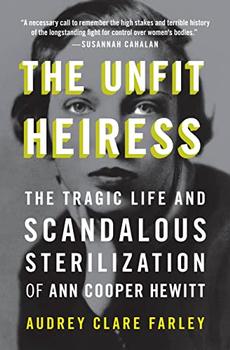Summary | Excerpt | Reviews | Beyond the Book | Readalikes | Genres & Themes | Author Bio

The Tragic Life and Scandalous Sterilization of Ann Cooper Hewitt
by Audrey FarleyPART I:
THE NEW WOMAN AND THE RISE OF EUGENICS
1
THE STERILIZED HEIRESS
Bulbs flashed as the socialite, sporting rouge and fur, took her seat alongside her attorney, who had called a press conference in his San Francisco office. The image of the solemn-faced, perfectly coiffed twenty-one-year-old would appear in newspapers across the country. Some, like the New York Times, would print nearly fifty stories detailing the woman's private life—her childhood, romantic relationships, spending habits, even the lingerie she was wearing. (It was imported from France.) It was January 1936, and heiress Ann Cooper Hewitt was suing her mother, Maryon Cooper Hewitt, in court for half a million dollars. The plaintiff claimed that her mother paid two doctors to "unsex" her during a scheduled appendectomy in order to deprive her of an inheritance from her millionaire father's estate.
Ann's father was Peter Cooper Hewitt, whose invention of the mercury-vapor lamp in 1901 earned him more than $1 million. The money from this creation supplemented an already sizable bank account, as Ann's father was also the grandson of an even more famous engineer—Peter Cooper. Cooper was behind a slew of inventions in the nineteenth century, including gelatin dessert and the steam locomotive. His ingenuity, coupled with investments in real estate, railroads, and the insurance industry, made him one of the richest men in New York City before his death in 1883. Cooper's children and grandchildren dutifully expanded the family wealth with their own business enterprises. When Ann's father died in 1921, his estate was worth over $4 million (the equivalent of $59 million today).
Peter Cooper Hewitt's will stipulated that two-thirds of his estate was to go to Ann and one-third to his wife, Ann's mother, after his death. The will also stipulated that Ann's share reverted back to her mother if she died childless. Knowing this, Ann asserted in her civil complaint, her mother had secretly paid two California doctors to remove her fallopian tubes. Mrs. Cooper Hewitt had done this with money obtained from Ann's trust fund eleven months before her twenty-first birthday—the point at which the woman would have no further say in her daughter's medical care.
The plot was set in motion in August 1934, when Ann and her mother were at the Coronado beachside resort outside San Diego. Over lunch, Ann talked of becoming an adult and finding a man to marry when she was suddenly struck with stomach pains. Their driver rushed them back to San Francisco, where Ann's private physician, Dr. Tilton Tillman, was waiting for her at Dante Sanatorium on Broadway. "Well, Ann, I understand you have appendicitis," said Tillman, upon her arrival at the hospital.
According to the plaintiff, Tillman never examined her abdomen. Instead, he led her to another room, where an alienist (an early-twentieth-century term for a psychologist) named Mary Scally began to ask her civics questions: Why did the Pilgrims come to America? What is the duration of a presidential term? What is the longest river in the United States? When was the Battle of Hastings fought?
"I didn't pay much attention or know what it was about," Ann recalled at the press conference. "Four days later, I returned to the hospital for my appendectomy, which was performed by Dr. Samuel Boyd. No one told me anything else."
The heiress reported that she stayed at the hospital for several weeks to recover from the procedure. During this time, she overheard a few staff members asking her nurse how the "idiot patient" was doing. Ann also heard her nurse make several phone calls to Dr. Tillman assuring him that his patient "didn't suspect a thing."
"I learned then that my mother and Dr. Tillman had told everyone that I was a mental case," Ann testified. "I discovered that I had undergone a salpingectomy, having my tubes removed along with my appendix."
Excerpted from The Unfit Heiress by Audrey Farley. Copyright © 2021 by Audrey Farley. Excerpted by permission of Grand Central Publishing. All rights reserved. No part of this excerpt may be reproduced or reprinted without permission in writing from the publisher.
The good writer, the great writer, has what I have called the three S's: The power to see, to sense, and to say. ...
Click Here to find out who said this, as well as discovering other famous literary quotes!
Your guide toexceptional books
BookBrowse seeks out and recommends the best in contemporary fiction and nonfiction—books that not only engage and entertain but also deepen our understanding of ourselves and the world around us.